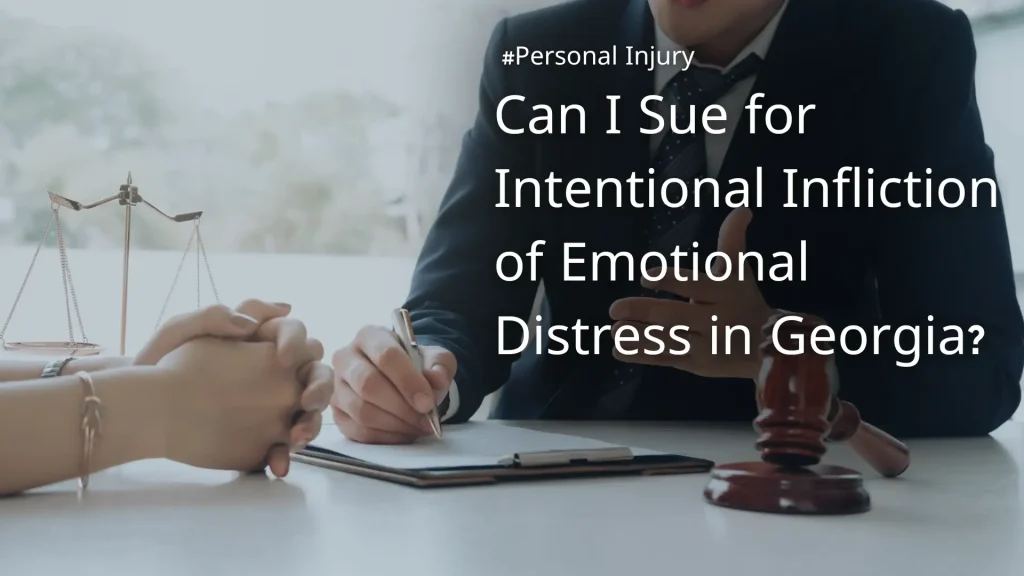Posted on Friday, November 29th, 2024 at 9:00 am

In Georgia, victims of extreme emotional harm resulting from another person’s outrageous behavior may have grounds to file a claim for intentional infliction of emotional distress (IIED). Understanding the elements required to prove such a claim can help determine if you have a valid case and what steps to take next.
What Is Intentional Infliction of Emotional Distress (IIED)?
Intentional infliction of emotional distress occurs when one person’s extreme and outrageous conduct causes another person severe emotional harm. Unlike other tort claims, IIED does not require physical injury. Instead, the focus is on the emotional and mental distress suffered by the victim.
Several situations can lead to claims of intentional infliction of emotional distress. Some common examples include:
- Workplace Harassment – Persistent bullying, unwelcome advances, or extreme mistreatment by an employer or coworker that causes emotional turmoil, anxiety, or depression
- Stalking or Threatening Behavior – Repeatedly following or threatening someone, causing ongoing fear, stress, and emotional distress
- Defamation or False Accusations – Spreading harmful, false information or making damaging claims about someone, leading to emotional harm, shame, and loss of social standing
- Emotional Abuse – Intentionally causing distress by manipulating, controlling, or belittling someone in personal relationships, leading to significant emotional damage
- Public Humiliation – Actions aimed at publicly embarrassing or degrading someone, causing distress and long-term emotional harm
Elements of an IIED Claim in Georgia
In Georgia, successful IIED claims require the plaintiff to prove three key elements:
- That the defendant acted intentionally or recklessly
- That the defendant’s conduct was outrageous or extreme, beyond what society tolerates
- That the emotional harm they experienced was severe enough to have a lasting impact on their well-being or quality of life
How Does Georgia Define “Outrageous” or “Extreme” Conduct?
In Georgia, not all hurtful behavior qualifies as sufficiently “outrageous” or “extreme” to be grounds for an IIED claim. Courts require that the conduct go far beyond rudeness, insults, or minor conflicts. For behavior to meet the standard, it must be so extreme in degree that society views it as completely unacceptable. For example, repeated harassment, threats, or shocking public behavior might qualify, especially if it was aimed at harming someone emotionally. Courts may look at the power dynamics involved, such as employer-employee relationships, or specific situations where the defendant’s conduct was intended to harm the victim’s mental or emotional well-being.
Can I Sue for Emotional Distress Without Physical Injury in Georgia?
In Georgia, you may pursue an IIED claim even if you haven’t suffered a physical injury. Unlike many personal injury claims, which are typically based on negligence, IIED focuses on intentional mental and emotional harm rather than physical harm. However, the emotional distress must be severe and significant enough to disrupt your daily life. Courts typically look for evidence that the distress had a lasting impact, such as requiring therapy, affecting work performance, or creating ongoing emotional struggles. While the absence of physical injury makes these cases more challenging to prove, strong evidence of substantial mental harm can support an IIED claim in Georgia.
How Do I Prove Emotional Distress?

To succeed in an IIED claim in Georgia, you must provide solid evidence that supports each element of the claim. Courts typically expect evidence of emotional distress that goes beyond temporary or minor issues, showing instead severe, long-term effects on mental well-being. Key evidence might include:
- Medical records documenting treatment for anxiety, depression, or other conditions that resulted from the defendant’s actions
- Therapist or counselor testimony that helps establish the severity and impact of the emotional harm
- Personal testimonies from friends, family members, or colleagues showing how the distress has affected your daily life, relationships, or work performance
- Emails, texts, or written records showing the defendant’s outrageous conduct
- Documentation of physical symptoms related to emotional distress, such as insomnia or stress-related illness
Gathering this detailed evidence can be critical for supporting your claim. Your personal injury lawyer can help with the evidence gathering process.
Contact a Georgia Personal Injury Lawyer to Initiate Your IIED Claim
If another party intentionally or recklessly inflicted emotional distress that’s had an ongoing or long-term impact on your life, you deserve to hold them accountable for the harm they’ve caused. Jonathan R. Brockman, P.C. can help. We’ll bring over 30 years of experience and a successful track record to your fight for justice and will pursue the total compensation and sense of justice you deserve. Contact us online or call 770-205-8887 today for a free initial consultation with a compassionate and hardworking Georgia personal injury attorney.
Related Posts:
